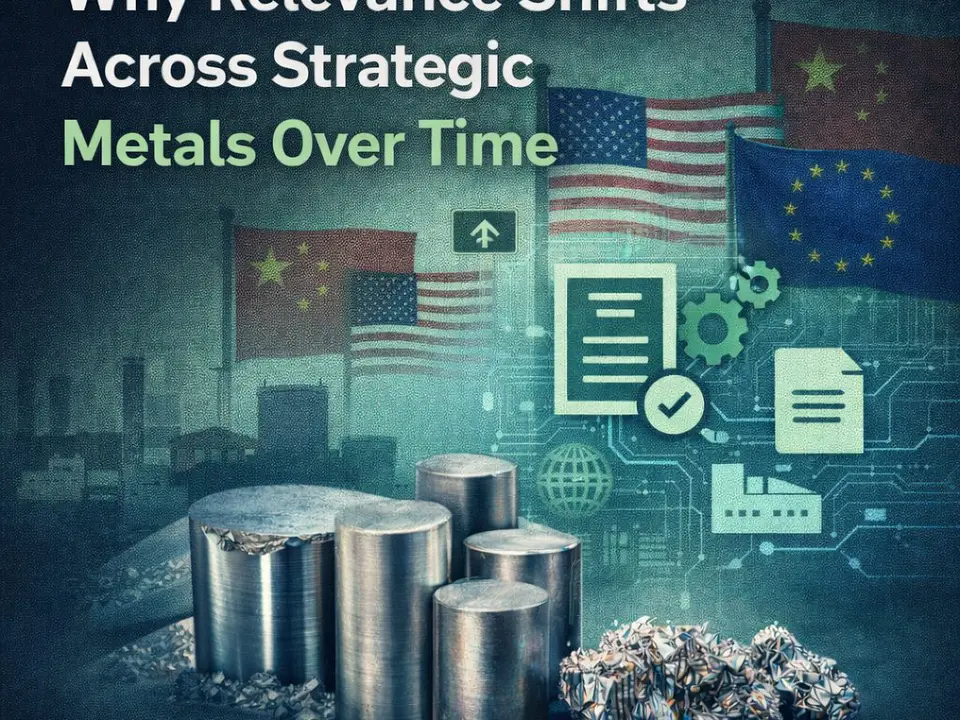
Weekly News Review September 29 – October 5 2025
October 5, 2025
Indium’s Quiet Rally: How a Rare Metal Is Powering the Digital and Green Transition
October 14, 2025CHINA AGAIN TIGHTENS RARE EARTH EXPORT RULES:
China has further tightened its export regulations for the rare earths sector and associated technologies. The new rules now extend to products manufactured abroad. This was announced in a statement from China’s Ministry of Commerce on Thursday. The measures clarify the export restrictions introduced in April for specific rare-earth elements, such as terbium and dysprosium, and their compounds.
Following the April restrictions, exports of some rare earths temporarily fell to zero. As with previous measures of this kind, Thursday’s regulations are justified on national security grounds, as rare earths are considered dual-use goods with both civilian and military applications.
Foreign companies will now need Beijing’s approval to export magnets that contain even trace amounts (more than 0.1 percent) of certain rare-earth metals of Chinese origin or manufactured using Chinese technologies. The ministry stated that export licenses requested for foreign military end users will generally be denied. Exports for semiconductor manufacturers and related equipment will be evaluated on a case-by-case basis, as will those for artificial intelligence development.
Some of the new export rules are effective immediately, while others will be implemented gradually starting December 1.
At the same time, the Department of Commerce announced in a separate statement that it would add the rare earth elements holmium, erbium, thulium, europium, and ytterbium, as well as related materials, to the existing export control list. This is to be implemented on November 8.
“New Regulations Reflect Existing U.S. Export Controls”
The backdrop to these developments is likely the rising geopolitical tensions with the United States. The new measures mirror existing U.S. export controls, Bloomberg reports, which aim to restrict China’s access to advanced chips and the technologies used to produce them. Just one day earlier, U.S. lawmakers had called for a broader export ban on chipmaking equipment to China, Reuters reported.
China’s announcement comes just weeks ahead of a planned meeting between Presidents Donald Trump and Xi Jinping. From a geostrategic perspective, this could strengthen Beijing’s negotiating position in advance, Reuters cites Tim Zhang, founder of Singapore-based Edge Research. How the new restrictions will be enforced remains unclear, Bloomberg notes, but their implementation could hinder efforts to establish alternative supply chains for rare earths.
MINE TO MAGNET: AUSTRALIA AND US JOIN FORCES FOR US SUPPLY CHAIN –
Leading non-Chinese rare earth producer and U.S. magnet manufacturer announce partnership.
Australian company Lynas, the largest producer of rare earths outside China, is set to partner with Noveon Magnetics, a U.S. manufacturer of rare-earth magnets. On Wednesday, the signing of a corresponding Memorandum of Understanding (PDF) was announced. The goal is to establish a strategic partnership to strengthen the U.S. rare earth supply chain, supplying both civilian and military industries.
Lynas mines rare earths at its Mount Weld site in Australia and refines the materials at its plant in Malaysia. In addition, the company began initial production steps in Australia nearly two years ago. With support from the Pentagon, Lynas plans to build another separation facility in the U.S.; however, the project’s continuation currently faces uncertainties. Lynas is also the first non-Chinese supplier of heavy rare earths, whose production remains heavily concentrated in China.
Noveon operates a magnet factory in San Marcos, Texas, with a current capacity of 2,000 tons per year. The company says this could be scaled up to 10,000 tons annually. For raw material supply, Noveon relies on emerging Western supply chains and also incorporates recycled materials.
Expanding the Middle of the Value Chain:
The two companies currently cover mainly the upstream and downstream segments of the rare-earth value chain. The partnership also aims to develop the intermediate steps, namely the production of metals and alloys for further processing into magnets. Specific details have not been disclosed.
According to the joint statement, the planned collaboration is a “direct response to supply chain disruptions and end-user demand”. China, which dominates the global rare earth market, imposed export restrictions in April on certain rare earth elements used for high-performance magnet production. Since then, the development of alternative Western supply chains has accelerated, led primarily by the U.S.
UNITED STATES: PENTAGON TAKES ANOTHER STAKE IN ANOTHER MINING COMPANY:
The Pentagon is investing in a mining project in Alaska by securing a 10 percent stake in Trilogy Metals. At the same time, the U.S. government has authorized the approval of a planned access road to the remote mining area.
Reducing supply chains for critical minerals’ dependence on China is a key priority for the current U.S. administration. In addition to accelerated permitting and research initiatives, funding and increasingly direct investments in companies are being used as tools to achieve this goal. In mid-July, the U.S. Department of Defense made headlines by taking a stake in MP Materials, the country’s leading rare earths company. In the following months, the U.S. government made additional investments in companies across the critical raw materials supply chain.
Now, another strategic investment has been announced: The mining companies Trilogy Metals, South32, and their joint venture Ambler Metals will receive nearly $36 million, again via the Pentagon, as was the case with MP Materials. Ambler Metals owns the Upper Kobuk Mineral Projects, a series of deposits in northwest Alaska containing copper, cobalt, zinc, lead, gold, and silver, among other minerals. The funds are intended to support the further development of these mining projects.
As part of the investment, the Pentagon will also acquire approximately a 10 percent stake in the Canadian company Trilogy Metals. In addition, the U.S. government has the right to purchase another 7.5 percent of the shares at a pre-set price at a later date.
Ambler Road Needed to Develop Remote Mining Area in Alaska:
According to the announcement, the three companies and the U.S. government also plan to collaborate on permitting, financing, and construction of the Ambler Road (officially known as the Ambler Access Project). The planned 340-kilometer road would provide access to the remote Upper Kobuk Mineral Projects and is essential for their development.
The White House also announced on Monday that President Donald Trump has directed his administration to issue the necessary permits for the project. Despite the anticipated economic benefits to the region, the road’s construction has been controversial, according to the Anchorage Daily News. Ambler Road had previously been approved during Trump’s first term but was later blocked by his successor, Joe Biden, due to environmental concerns.
U.S. Funding for Australian Rare Earth Project Announced Simultaneously:
On Monday, the U.S. also announced additional plans to strengthen raw materials supply chains: The government-backed Export-Import Bank (EXIM) has offered the Australian mining company VHM Limited a non-binding financing package of up to $200 million. The funds are intended to support the further development of VHM’s Goschen rare earth and mineral sands project in the southeastern state of Victoria, Australia. However, China is also interested in this project: In February 2024, the Chinese rare-earth company Shenghe Resources secured 60 percent of Goschen’s annual production.
FRANKFURT AM MAIN, GERMANY – From September 1 to 3, our Founder and Managing Director, Matthias Rüth, accompanied German Foreign Minister Dr. Johann Wadephul on a business delegation to India—the trip aimed to discuss economic cooperation, innovative technologies, and the supply of strategic raw materials.
TRADIUM was one of 13 German companies that accompanied Foreign Minister Dr Johann Wadephul on his inaugural visit to India. The stops on the trip were in Bangalore and New Delhi. Here is the press release and details on the trip: https://tradium.com/tradium-as-part-of-the-business-delegation-of-foreign-minister-dr-johann-wadephul-in-india/






